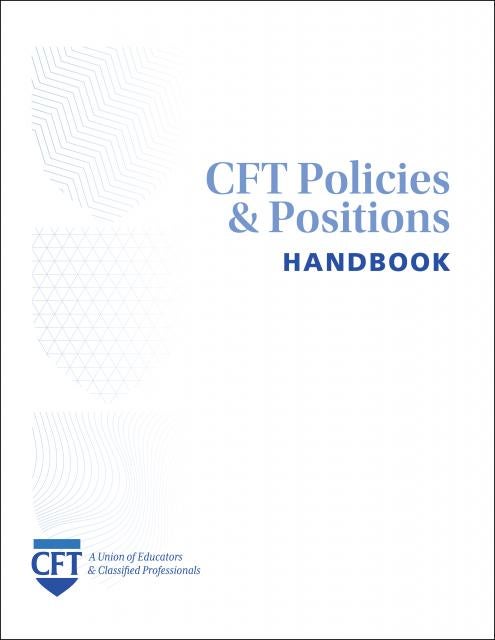What Do Our Positions Mean?
Learn about the CFT philosophy
About CFT Positions on Legislative Bills
The positions found in CFT Legislative Updates and the Legislative Report are defined below.
Support
CFT agrees with the policy provisions, and will work to support the bill in the legislative process.
Oppose
CFT does not support the bill, and will work to defeat the bill in the legislative process.
Watch
May mean that the bill has both good and bad points, or that CFT prefers to wait for future amendments or a later time to take a position.
Oppose Unless Amended (OUA)
CFT does not support the bill, but would remove opposition if key amendments are made. If these amendments are made, CFT’s position will then be modified to a “support” or “watch” position.
Support If Amended (SIA)
CFT will support a bill if specific amendments are made to the bill’s provision
About Our Core Philosophy
The CFT Policies and Position Handbook is a living document adopted in 2018 that aids Federation officers, leaders, and activists in determining legislative positions on bills affecting union members in every division of education, public and private.
In addition to the objectives outlined in our constitution, the CFT takes positions on social, economic, and cultural issues underlying the union’s mission. The Federation demonstrates its adherence to this set of ideals in stands it takes on legislation and initiatives, in its endorsements of candidates, and in its distribution of Committee on Political Education funds.
We support these policies and positions because education does not take place in a vacuum but in the real world. Changes in that world, whether political, social, economic or philosophical, affect students and education workers, making their tasks more difficult as they struggle to adjust the educational process to external forces. Attention to socio-economic issues makes it possible to address educational issues more clearly.
Thus, the CFT is committed to:
- A progressive system of taxation to achieve adequate funding of education and other social programs;
- An end to violence, racism, sexism, homophobia and other forms of intolerance;
- A guarantee of a minimum level of health care, food, and housing to every member of society;
- An increase of civic involvement by all members of society;
- An improvement in the democratic processes of government;
- A governmental policy addressing full employment;
- Providing universal child care;
- Education regarding nutrition and health living requirements;
- Reform in labor law in order to equalize the balance of power between labor and management;
- The protection of the environment;
- Democracy, freedom and social responsibility in the United States and the rest of the world.

